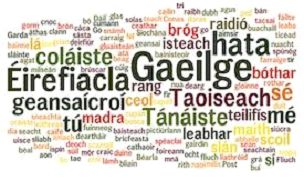Irish Gaelic activists have certainly been silent in recent months about what I thought they might regard as a grievous insult to the Irish language.

The European Commission has just completed a consultation on abolishing 'daylight saving time' and in due course will produce some proposals. The consultation ran from 4 July to 16 August information about it was available on the European Commission website.
There will various views about 'daylight saving time' but I was interested to find the following on the web-page with information about the consultation. This is what the European Commission said:
The online questionnaire is accessible in all official EU languages (except Irish) and replies may be submitted in any EU language. We do encourage you to answer as much as possible in English.
Irish Gaelic is one of the 24 official languages of the European Union and Irish language activists are always keen to assert the rights of Irish speakers, so here are some questions.
Why did the European Commission exclude the Irish language from the online questionnaire?
What did the government of the Irish Republic do or say about the exclusion of Irish?
What did the MEPs from the Republic do or say about the exclusion of Irish?
What did the Sinn Fein MEP Martina Anderson do or say about the exclusion of Irish?
What did Irish language organisations such as Conradh na Gaeilge do or say about the exclusion of Irish?
Why was there no protest by Irish language activists outside the office of the European Commission in Belfast, rather in the same way as they did outside the Department for Communities?
Perhaps some answers will be forthcoming but in the meantime I was disappointed by the exclusion of Irish because it would have been interesting to see how many of the respondents from the Irish Republic or indeed Northern Ireland would have responded in Irish and how many in English!
On the other hand, while the questionnaire is accessible in 23 of the 24 official languages, with Irish excluded, it states that 'replies may be submitted in any EU language', so was it possible to read the questionnaire in English and yet reply in Irish; and if so how many people did? So that brings the number of questions up to seven.

